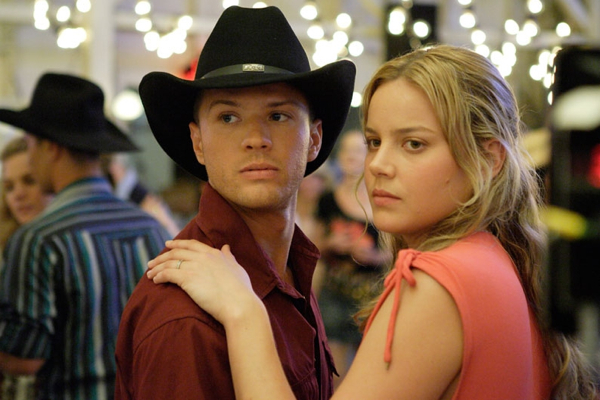Movie review by Greg Carlson
In “Stop-Loss,” Kimberly Peirce mostly follows the strong filmmaking instincts she displayed in her chilling feature “Boys Don’t Cry,” although the story this time is far less gripping. A war movie in the sub-category of “returning home” tales, “Stop-Loss” jettisons political fire in favor of a handsomely drawn portrait of a small town coming to grips with the social costs exacted by combat. The movie’s vibe is occasionally reminiscent of Vietnam films like “The Deer Hunter” and “Coming Home,” two well-remembered late-70s works that overshadow “Stop-Loss” in most respects. American audiences will likely ignore the movie, and it is precisely this apathy about the war in Iraq that hamstrings the film’s thematic agenda.
Ryan Phillippe, who recently played a disillusioned soldier of World War II in “Flags of Our Fathers,” applies more of the same clenched-jaw stoicism to his Staff Sgt. Brandon King. Depicted by the moviemakers as a squared-away, by-the-book straight arrow, King is overwhelmed by grief and guilt when he loses men in tense urban combat in Tikrit. Once he and pals Steve (Channing Tatum) and Tommy (Joseph Gordon-Levitt) return to Brazos, Texas, it is instantly clear that stateside readjustment will not come easy. Peirce ladles out generous portions of genre tropes, from post-trauma flashbacks to alcohol soaked binges to domestic abuse.
Abbie Cornish, who plays Steve’s long-suffering fiancée Michele, receives second billing and a seat in the getaway car next to King when he goes AWOL. “Stop-Loss” might have had something more powerful to say about the coping mechanisms of family members with loved ones in the military, but the story is unrelentingly filtered through King’s eyes, leaving Cornish with little to do beyond react to King’s run of troubles. All of the movie’s female characters are given precious little screen time, and suffer the same fate.
“Stop-Loss” caroms wildly between shoulder-shrugging support for the war and the central character’s indignation at being mistreated by a government he dutifully served. Despite spitting out a line of profanity admonishing George W. Bush (likely designed to draw cheers of approval in many theaters), the movie plays it completely safe in the arena of too-familiar gung-ho abstractions like honor, duty, and brotherhood. As a result, the movie cannot win, since doves will feel let down by the outcome and hawks won’t stand for the movie’s long road trip of bitter disobedience.
Peirce can be commended for at least trying to make a serious-minded feature about a conflict that is still unfolding, but the movie is too confused, toothless, and squishy to stand for anything specific. Does Peirce disagree with a policy that, in essence, operates as a “back door draft” (to use the movie’s term) to keep overtaxed soldiers on the front lines? One might say the answer is “I guess so,” but “Stop-Loss” feints when it should be swinging hard. It acquiesces when it could take a stand. The movie, which too often relies on the adrenaline-fueled, ass-kicking jingoism of chest-thumping American might, flits between scenes that would be at home in a recruitment video and reminders that young men come home missing their eyesight or limbs. This ambiguity is a liability, and “Stop-Loss” never finds a solid grip.
